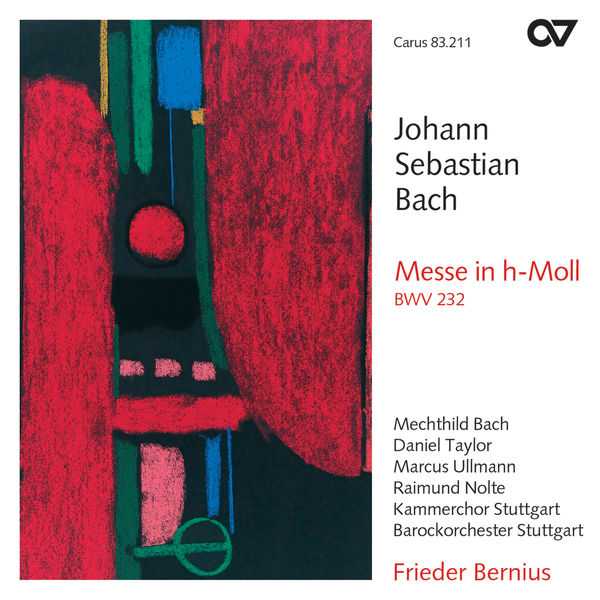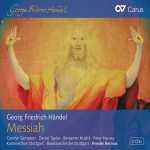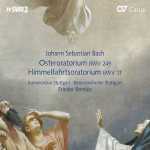
Composer: Johann Sebastian Bach
Performer: Daniel Taylor, Raimund Nolte, Mechthild Bach, Marcus Ullmann, Kammerchor Stuttgart
Orchestra: Barockorchester Stuttgart
Conductor: Frieder Bernius
Number of Discs: 2
Format: FLAC (tracks)
Label: Carus
Catalogue: CAR83211
Release: 2007
Size: 434 MB
Recovery: +3%
Scan: cover
Mass in B minor, BWV232
CD 01
01. No. 1 Kyrie Eleison I
02. No. 2 Christe eleison
03. No. 3 Kyrie eleison II
04. No. 4 Gloria in excelsis Deo
05. No. 5 Et in terra pax
06. No. 6 Laudamus te
07. No. 7 Gratias agimus tibi
08. No. 8 Domine Deus
09. No. 9 Qui tollis peccata mundi
10. No. 10 Qui sedes ad dexteram Patris
11. No. 11 Quoniam tu solus sanctus
12. No. 12 Cum Sancto Spiritu
CD 02
01. No. 13 Credo in unum Deum
02. No. 14 Patrem omnipotentem
03. No. 15 Et in unum Dominum
04. No. 16 Et incarnatus est
05. No. 17 Crucifixus
06. No. 18 Et resurrexit
07. No. 19 Et in Spiritum Sanctum
08. No. 20 Confiteor unum baptisma
09. No. 21 Et expecto resurrectionem
10. No. 22 Sanctus
11. No. 23 Osanna in excelsis
12. No. 24 Benedictus
13. No. 25 Osanna in excelsis
14. No. 26 Agnus Dei
15. No. 27 Dona nobis pacem
Frieder Bernius gives us a B minor Mass which neither sits obediently in the groove of seasoned reverence nor resorts to well-worn and predictable period reflexes. It is a reading whose invigorating momentum is underpinned by a confident bass presence and an immediacy which resolutely ignores the heavy burden of posterity from which performances regularly suffer.
To say that the buoyant, syncopated concertante- like second Kyrie heralds an iconoclastic journey would be an exaggeration but Bernius knowingly approaches the Latin text as a means of liberating the abstract brilliance and lyricism inherent in Bach’s great edifice. The ‘Et in terra pax’ is exquisitely judged with every one of those aspiring figures each yielding a little more ambition, as is the case in the urgent ‘Gratias agimus’ – though perhaps too driven for some. The same is true in both the ‘Qui sedes’ and Agnus Dei (despite the introduction being alarmingly faster than the initial vocal strains), sung by the refined Daniel Taylor, where both are approached with an easy and open-ended fluidity which avoids the obvious pit-falls of ‘stop-start’ between solo movements and the virtuoso ensemble ‘concerti’.
Bernius repeatedly seeks a close alliance between his singers and instrumentalists with eloquent arched lines and yet without an obsession for homogeneity at the expense of individual character in the ensemble. The ‘Crucifixus’ is given an unselfconscious and gently accentuated reading, the chromatic ground and the flute and string ‘pointings’ instinctively realised. If the ‘Confiteor’ falls slightly short, the large choruses are open-breathed and thrilling. The Stuttgart Chamber Choir are full of vim and alertness and the trumpet playing is cataclysmically brilliant throughout. Of the solo singers, special mention must be made of the bass, Raimund Nolte, whose soft-grained ‘Et in Spiritum Sanctum’ stands out, though it is the effect of the combined ingredients which makes this the most striking and satisfying Mass in B minor to have appeared in years.



